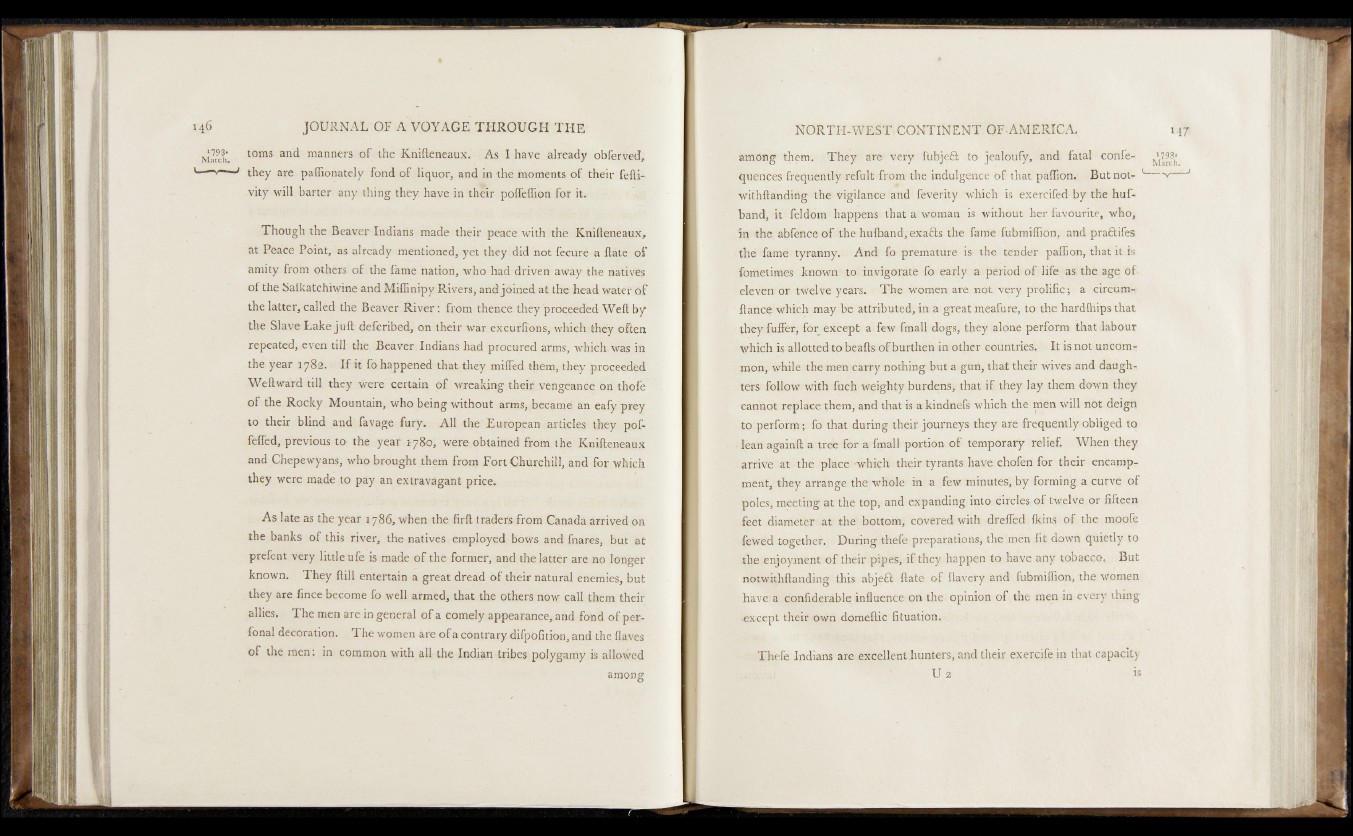
toms and manners p f the Knifteneaux. As I have already ob'ferved,
they are paffionately fond of Jiqupr, and in the moments of their fefti-
vity will barter any 'thing they haye in their ppfifeffion;jof it.
Though the Beaver Indians made their peace, with :thfe< Knifteneaux*
at Peace Point, as already mentioned, :yet-they did not feciiré a ftate o f
amity from tkheAïefcthe fame nation, who had drive» aw-ay the natives
of the Safkatchiwme and Miffinipy Rivers, anAjdined at the head water ó f
the latter, called the Beaver River: from thencfethey proceeded Weft by
the Slave Lake juft dcferibed, on their war excurftbns, whieh fehey often
repeated,.even till the Beaver. Indians had procured arras, which was in
the year 1782. c If it fbhapperied thatthey mifftd thern^thfey proceeded
Weftward till they were certain ©f wreaking their, vengeance on thoftT
o f the Rocky Mountain, who being without arms,,became} an eafy prey
to their blind and favage fury. All the: European < artides- f e y pof-
feffed, previous to- the year 1780, were obtained from the Knifteneaux
and Chepewyans, who brought them from Fort Churchill, and for which
they were made to pay an extravagant price.
As late as the year 1786, when the firft traders from.Canada arrived, on
the banks of this river, the natives employed bows and fnares, but at
prefent very little ufe is made of the former, and the latter are no longer
known. They ftill entertain-a great dread óf their natural enemies, but
they are fince become fo well armed, that the others now call them their
allies. The men are in general of a comely appearance, and fond of personal
decoration. The women are of a contrary difpöfitjqn, and the Haves
©f the men: in common with all the Indian tribes’polygamy is allowed
among
amon^them. They-' afro* 'verbs’' fnhjeQf ^©•feafoufy* > and fatal •• corife-s
qu^dds'Tfreq<uentljfe#refuk from »the 'indulgence'of that5 paffion. But not- 1 v -
withftandirig tbe< vigilasn'Gofand?fev£rityAwhioh is exercifedfty the huf-
band, it feld,dm"happens'£ that a'womans,: is w'ithoiuts her favourite, who,
jrft-he. abfdnceof the hufband;exa6ts the fame fubmiffion, and pra&ifes.
the fame:tyranny. And' fo .premature is the:-tender • paffion, that it is
forrietimes knownytoffindgoratb fo early-a?» period-? o f -life as. the age of.
ele v en'/or^eke years..? The women are notivery prolific;' a circ u tuft
ancdwhfch may be attributed’/ in, a great-meafure, to the1, hardfliips’that
they faffer, for. except a few. fmaft dbgs-, they alone perform that {labour
which is allotted to beafts-of burthen mother countries,;*- It is nobuneom-,
jero, whale the men early nothiig’ but aagurr, that their wives land daughters
follow with fuch weighty burdens, that i f they lay them down they
cannot replace them, and that Is a kindnefs which- the- nhffi will not deign
tO’perfofair.y fo that duringitheif-journeys .they are frequjintlyipbliged tq
- lean again® a1 trebfor; s> fundi portion» of' temporary relief When -they
arrive at the place-which their tyrantschave'c-hofen for their encampment,''
they arrange the'whole'ini a few minMe^iby-iformingt a curve- of
poles, meeting at the top, and expanding into.eircle&qf ve»©r ftfteert
feet diametfersatr the bottom, covered with dreffed fkins of,, the mpqfe
fewed together. Du«ng^rih'prepamtion#<thRi»en fit down quietlyto
.the eryoymenttof their spipes,-if they happen tq .have(any tqbaeco. But
nbtwithftanding this;» abject-ftate of ftavery-arid fubmiffion-, the women
have* a donfiderable influence- on the opinion-1 of-the men -in every thing
■ except their own domeftic fi.tuati-oft.jt',’ -
Thefe Indians are excellent’hunters, and thejg, exercife in that capacity
U n .d R is